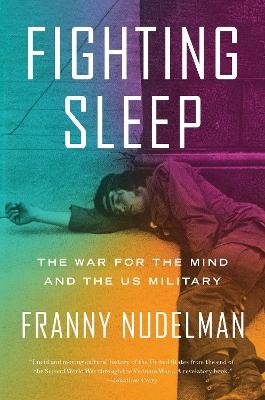
Fighting Sleep
The War for the Mind and the US Military
Seiten
2019
Verso Books (Verlag)
978-1-78663-781-9 (ISBN)
Verso Books (Verlag)
978-1-78663-781-9 (ISBN)
How the military used sleep as a weapon-and how soldiers fought back
On April 21, 1971, hundreds of Vietnam veterans fell asleep on the National Mall, wondering whether they would be arrested by daybreak. Veterans had fought the courts for the right to sleep in public while demonstrating against the war. When the Supreme Court denied their petition, they decided to break the law and turned sleep into a form of direct action.
During and after the Second World War, military psychiatrists used sleep therapies to treat an epidemic of "combat fatigue." Inducing deep and twilight sleep in clinical settings, they studied the effects of war violence on the mind and developed the techniques of brainwashing that would weaponize both memory and sleep. In the Vietnam War era, radical veterans reclaimed the authority to interpret their own traumatic symptoms-nightmares, flashbacks, insomnia-and pioneered new methods of protest.
In Fighting Sleep, Franny Nudelman recounts the struggle over sleep in the postwar world, revealing that sleep was instrumental to the development of military science, professional psychiatry, and antiwar activism. Traversing the fields of military and mainstream psychiatry, popular and institutional film, documentary sound technology, brain warfare, and postwar social movements, she demonstrates that sleep-far from being passive, empty, or null-is a site of contention and a source of political agency.
On April 21, 1971, hundreds of Vietnam veterans fell asleep on the National Mall, wondering whether they would be arrested by daybreak. Veterans had fought the courts for the right to sleep in public while demonstrating against the war. When the Supreme Court denied their petition, they decided to break the law and turned sleep into a form of direct action.
During and after the Second World War, military psychiatrists used sleep therapies to treat an epidemic of "combat fatigue." Inducing deep and twilight sleep in clinical settings, they studied the effects of war violence on the mind and developed the techniques of brainwashing that would weaponize both memory and sleep. In the Vietnam War era, radical veterans reclaimed the authority to interpret their own traumatic symptoms-nightmares, flashbacks, insomnia-and pioneered new methods of protest.
In Fighting Sleep, Franny Nudelman recounts the struggle over sleep in the postwar world, revealing that sleep was instrumental to the development of military science, professional psychiatry, and antiwar activism. Traversing the fields of military and mainstream psychiatry, popular and institutional film, documentary sound technology, brain warfare, and postwar social movements, she demonstrates that sleep-far from being passive, empty, or null-is a site of contention and a source of political agency.
Franny Nudelman is Professor in the Department of English Language and Literature at Carleton University in Ottawa, where she teaches US culture and history. She is the author of John Brown's Body: Slavery, Violence, and the Culture of War, and coeditor, with Sara Blair and Joseph Entin, of Remaking Reality: U.S. Documentary Culture after 1945.
| Erscheinungsdatum | 08.10.2019 |
|---|---|
| Verlagsort | London |
| Sprache | englisch |
| Maße | 140 x 210 mm |
| Gewicht | 265 g |
| Themenwelt | Geschichte ► Teilgebiete der Geschichte ► Militärgeschichte |
| Medizin / Pharmazie ► Medizinische Fachgebiete | |
| Sozialwissenschaften ► Politik / Verwaltung ► Politische Theorie | |
| ISBN-10 | 1-78663-781-2 / 1786637812 |
| ISBN-13 | 978-1-78663-781-9 / 9781786637819 |
| Zustand | Neuware |
| Haben Sie eine Frage zum Produkt? |
Mehr entdecken
aus dem Bereich
aus dem Bereich
neueste Manipulationstechniken als Waffengattung der NATO
Buch | Softcover (2023)
Westend (Verlag)
24,00 €
Deutschlands Schwäche in der Zeitenwende
Buch | Softcover (2023)
C.H.Beck (Verlag)
18,00 €


